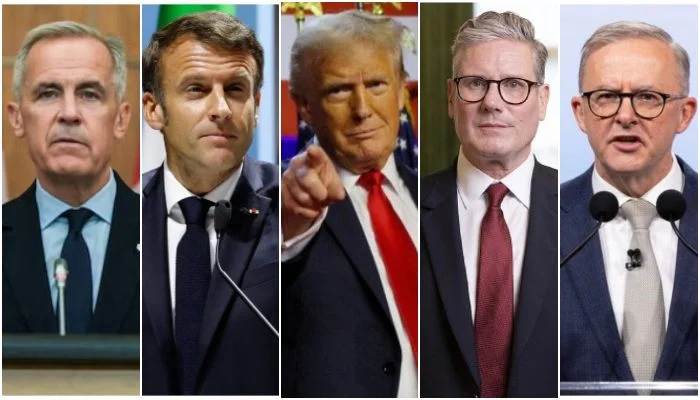Global Frustration Over Gaza Pressures Trump as Allies Recognize Palestine at UN
Then, during the UN General Assembly, Britain, France, Canada, Australia, and others announced recognition of Palestine.
New York — Tensions over U.S. policy in the Gaza war boiled over this week at the United Nations, as longtime American allies defied Washington to recognize the State of Palestine, marking a major diplomatic blow to President Donald Trump’s Middle East agenda.
From the opening of his second term, Trump promised to swiftly broker peace between Israel and Hamas. Instead, he now finds himself on the sidelines while the Israeli offensive intensifies and global frustration with U.S. inaction mounts.
The turning point came when Prime Minister Benjamin Netanyahu launched a strike against Hamas figures in Qatar earlier this month—undermining Trump’s plans to mediate a ceasefire and hostage release. In the aftermath, Israel’s ground offensive in Gaza City continued with little pushback from Washington, even as worldwide condemnation grew over the humanitarian toll.
Read more: Govt Announces Trip to Turkey for THESE Students!
Then, during the UN General Assembly, Britain, France, Canada, Australia, and others announced recognition of Palestine. Trump had cautioned against such moves, arguing they would effectively reward Hamas. Still, the shift proceeded, signaling eroding U.S. influence in the region.
“Trump has not been able to achieve any major progress or gains in the region, particularly on the Israeli‑Palestinian front,” noted Brian Katulis of the Middle East Institute. “Things are worse than when he entered office.”
Meanwhile, French President Emmanuel Macron criticized Trump’s handling of the conflict, declaring that if he truly desired a Nobel Peace Prize, he must act to end the war in Gaza.
Analysts offer contrasting views: some believe Trump underestimated the complexity of the conflict; others argue he has silently accepted that the Israeli prime minister will act according to his own priorities—and that the U.S. has limited capacity to influence him. Complicating the picture are domestic distractions, from high-profile political controversies to security decisions at home.
On the UN sidelines, Trump met with leaders from Saudi Arabia, UAE, Qatar, Egypt, Jordan, Turkey, Indonesia, and Pakistan. Reports suggested he would propose a postwar governance plan excluding Hamas and call for Arab nations to contribute forces to stabilize Gaza.
However, in his UN address, Trump rejected pressure to reverse his pro-Israel stance. He claimed that recognizing Palestine would “encourage continued conflict” and rewarded “these horrible atrocities.” He reiterated unwavering support for Israel.
Defending their decisions, countries like France and Canada argued that recognition preserves the two-state solution and could help bring an end to the Gaza war.
Observers interpreted their statements as a veiled warning to Trump. “It all depends on Trump, who could end this war with one choice word to Israel’s prime minister,” said Laura Blumenfeld of Johns Hopkins SAIS—adding that the word could be “enough.”
The U.S. remains Israel’s primary arms supplier and diplomatic shield at the UN. Last week, Washington vetoed a draft Security Council resolution calling for an unconditional and permanent ceasefire in Gaza.
Despite repeated opportunities, Trump has yet to leverage his power. Even after Israel struck a Hamas office in Qatar, Trump held a tense call with Netanyahu but refrained from action.
No matter how many nations recognize Palestine, full UN membership would require a Security Council vote—and the U.S. hold the veto power.
Some analysts speculate that Netanyahu’s upcoming visit to the White House might test Trump’s limits. If Israel proceeds with West Bank annexation, as rumored, Gulf states have warned they may rethink the Abraham Accords. The UAE has even threatened to suspend its role in the agreement.
Most Middle East watchers agree that Trump is unlikely to publicly rebuke Netanyahu, especially in Gaza. However, behind closed doors, pressures and influence may be in play.
Whether these gestures amount to meaningful change—or furthe





Comments are closed, but trackbacks and pingbacks are open.